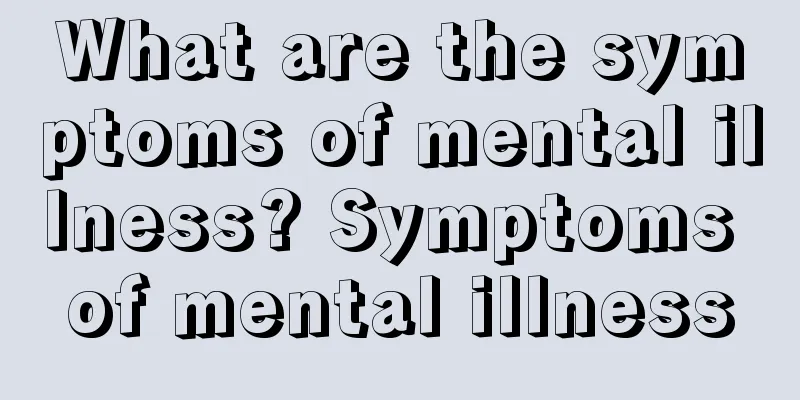What are the symptoms of mental illness? Symptoms of mental illness

|
According to surveys, the incidence of mental illness in the world has reached a very high level. Without human intervention and treatment, the disease will cause great harm and seriously affect people's lives and work. Therefore, we need to understand the specific manifestations of mental illness so that we can detect and treat it early. Anxiety disorders It shows obvious autonomic nervous system dysfunction, and physical discomfort such as dizziness, palpitations, dyspnea, dry mouth, frequent urination, urgency, sweating, etc. occurs in varying degrees. Physical tension, overreactivity of the autonomic nervous system, nameless worry about the future, and excessive alertness. Psychiatric disorders The symptoms include often feeling that others control their thoughts; feeling that others know their thoughts; feeling lonely even when with others and unable to communicate with others; often feeling that there are serious problems with their bodies; poor memory and a frequent feeling that there is something wrong with their brains, etc. phobia Performance: Arousing intense fear of an object or situation. Fear is often accompanied by obvious autonomic nervous system symptoms. Patients know that this fear is unnecessary, but they cannot control it and still try their best to avoid it. There are three common clinical types: agoraphobia, social phobia and simple phobia. Obsessive-compulsive disorder is often manifested as repeated obsessive thoughts and compulsive intentions and actions. Knowing that it is unreasonable and unnecessary, but unable to control it. Such as counting repeatedly, recalling repeatedly, repeating certain actions (such as washing hands) Somatization symptoms It refers to the patient's feelings when the body's physiological functions become abnormal in a diseased state. The manifestations of somatization symptoms are often complex and multi-site, involving any organ and function and can simulate the manifestations of any disease. The most common symptom is pain such as headache, chest pain, abdominal pain, muscle pain, etc.; common symptoms include fatigue, dizziness, shortness of breath, palpitations, abdominal distension; it can also manifest as indigestion, diarrhea, cough, difficulty walking, difficulty urinating, fainting or loss of consciousness, etc. Interpersonal sensitivity The main manifestations are: not being able to properly handle the relationship between individuals and society, feeling uncomfortable in the crowd, being wary, suspicious and jealous when getting along with others, having all kinds of confusion in interpersonal relationships, and having tense relationships with classmates and teachers. depression It is a psychological disorder caused by dysfunction of the brain's serotonin and norepinephrine neurotransmitter systems, characterized by depression, lack of interest or pleasure, persistent fatigue, and low motivation for life. It is often accompanied by psychosomatic symptoms such as nervousness, insomnia, early awakening, weight loss, and general discomfort. |
>>: How to effectively treat post-herpetic syndrome
Recommend
How can rheumatoid arthritis be completely cured
Rheumatoid arthritis is a relatively common disea...
Is colon cancer related to lifestyle habits?
Colon cancer is a common digestive tract malignan...
How long does it take to get pregnant?
Couples who are preparing for pregnancy certainly...
Things to note in daily life to prevent lymphoma
It is understood that in view of the increasing i...
Ascites is the main symptom of ovarian cancer
Ovarian cancer has a relatively high incidence ra...
What should patients with small cell lung cancer pay attention to in their diet
What should patients with small cell lung cancer ...
Who are the “quasi” diabetic patients?
With the development of society, people have beco...
Is melanoma harmful to the human body?
The early symptoms of melanoma are not very obvio...
How to prevent pancreatic cancer
Pancreatic cancer is one of the common malignant ...
How to prevent recurrence of osteosarcoma
Osteosarcoma has a very high incidence rate and i...
Men should also check their breasts regularly
The direct cause of breast cancer is the appearan...
Commonly used prescriptions for esophageal cancer
Commonly used prescriptions for esophageal cancer...
What are the symptoms of lung cancer? Be careful of these 4 lung cancer symptoms
Cough is one of the most common symptoms of lung ...
What to do if the formaldehyde level in the house exceeds the standard
If the formaldehyde level in a house exceeds the ...
How to prevent stomach cancer? Do these five things
One of the malignant tumor diseases is gastric ca...









